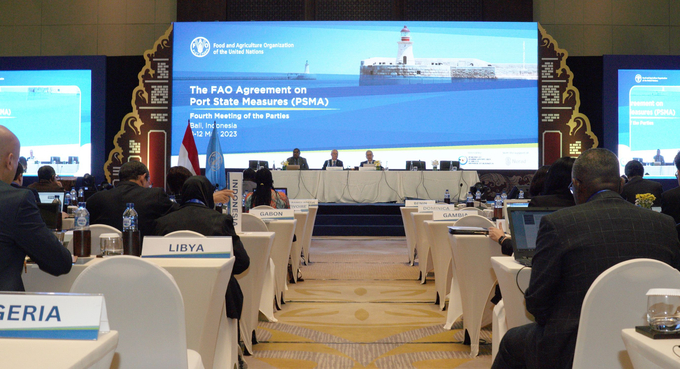May 21, 2025 | 06:05 GMT +7
May 21, 2025 | 06:05 GMT +7
Hotline: 0913.378.918
May 21, 2025 | 06:05 GMT +7
Hotline: 0913.378.918

The Fourth Meeting of the Parties has endorsed a strategy to increase adherence to the PSMA.
Parties to the Food and Agriculture Organization of the United Nations’ Agreement on Port State Measures (PSMA) have agreed to strengthen efforts to combat Illegal, Unreported and Unregulated (IUU) fishing by extending vessel inspections, exchanging global information and improving the capacity of developing states.
The Fourth Meeting of the Parties, an event hosted by the Indonesian Government in Bali (May 8-12), has endorsed a strategy to increase adherence to the PSMA.
The Parties also agreed to take the Global Information Exchange System (GIES), a digital system developed by FAO at the request of the Parties, from its current pilot phase to a fully operational system by the end of this year.
“FAO is working with countries and regional fisheries management organizations to combat IUU fishing, by reviewing national legislation, identifying ways to strengthen their institutional capacity, and helping them enhance their monitoring and surveillance systems, so they can effectively implement the PSMA and other international instruments to promote sustainable fisheries,” said Manuel Barange, the director of FAO’s fisheries and aquaculture division.
Currently, one in three fish stocks are overfished. With the rising demand for aquatic foods, ensuring that all stocks are managed sustainably is crucial.
The PSMA has the highest rate of adherence of all international fisheries instruments. It is the first binding international agreement designed to prevent, deter and eliminate IUU fishing by stopping foreign vessels engaging in it, from using ports, landing their catches, even denying them entry. It is a key instrument to block fish products derived from IUU fishing from entering international markets.
So far 75 Parties, including the European Union as one Party on behalf of its Member States, have adhered to the PSMA. This represents 59 percent of port States globally. Timor-Leste became the latest Party to the agreement at the end of last month.
The Global Information Exchange System (GIES) plays a critical role in supporting the implementation of the PSMA. It is a global system that shares vital information including inspection reports and actions taken on foreign fishing vessels engaged in IUU fishing.
“We need streamlined information exchange and digitalization for the PSMA to effectively combat IUU fishing,” said Matthew Camilleri, senior fishery officer and head of the Fisheries Global and Regional Processes Team in FAO’s fisheries and aquaculture division.
During this Fourth Meeting of the Parties, Parties to the PSMA pledged further support to the Global Capacity Development Programme, which has to date supported more than 50 developing States in improving their capacity to combat IUU fishing.
The PSMA entered into force in June 2016 and the Meeting of the Parties is convened biennially to discuss matters related to the implementation of the Agreement.
The Fourth Meeting of the Parties received financial support from the Government of Norway.
(FAO.org)

(VAN) Attempts to bring down the price of the Japanese staple have had little effect amid a cost-of-living crisis.

(VAN) Fourth most important food crop in peril as Latin America and Caribbean suffer from slow-onset climate disaster.

(VAN) Shifting market dynamics and the noise around new legislation has propelled Trouw Nutrition’s research around early life nutrition in poultry. Today, it continues to be a key area of research.

(VAN) India is concerned about its food security and the livelihoods of its farmers if more US food imports are allowed.

(VAN) FAO's Director-General emphasises the need to work together to transform agrifood systems.

(VAN) Europe is facing its worst outbreak of foot-and-mouth since the start of the century.

(VAN) The central authorities, in early April, released a 10-year plan for rural vitalization.